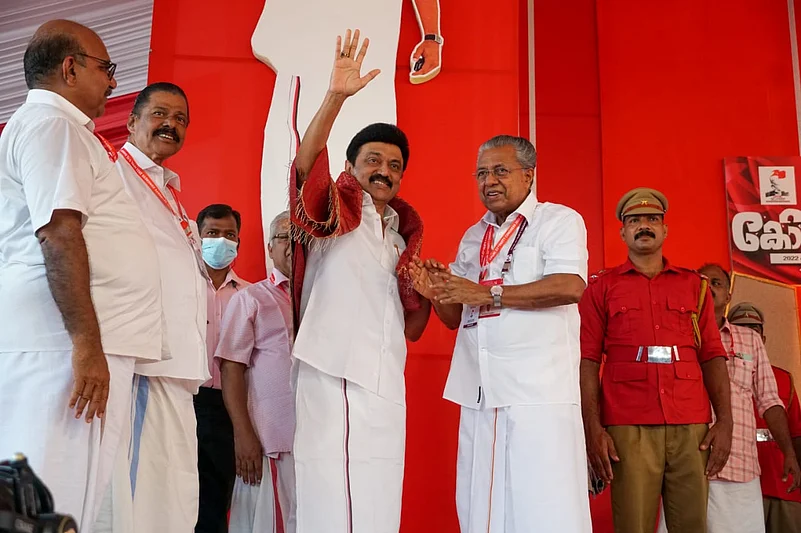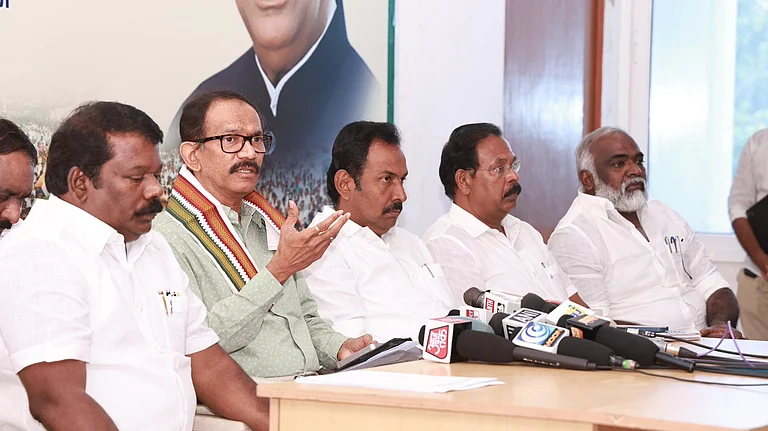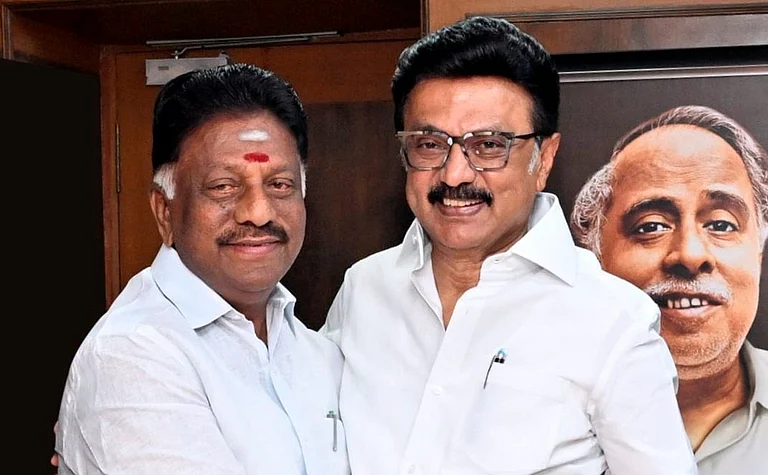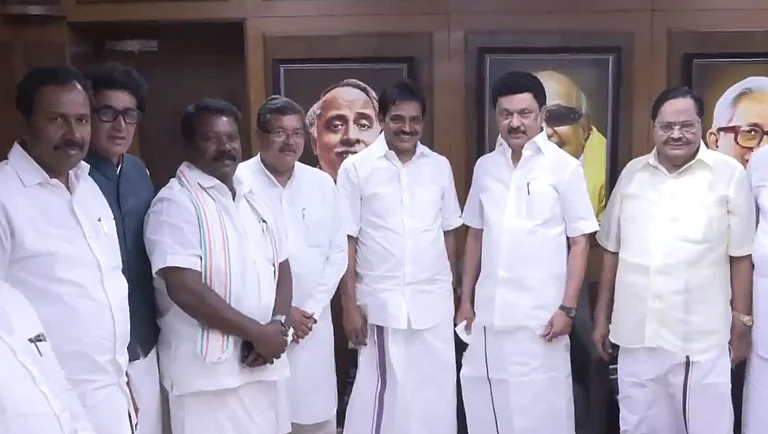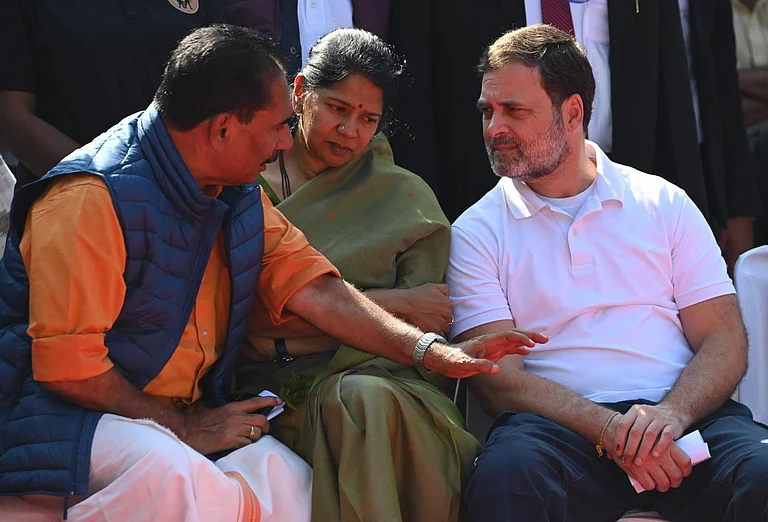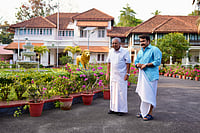
Summary of this article
Kerala and Tamil Nadu, unsettled by the Election Commission’s voter roll revision, brace for political repercussions.
BJP says the SIR will help identify bogus voters allegedly included in the rolls at the behest of the ruling parties.
Tamil Nadu has called an all-party meeting on November 2.
Even as the Election Commission faces off with the Supreme Court of India over its Special Intensive Revision of voter rolls, the ECI has decided to undertake the SIR in poll-bound Southern states.
Unease over voter rolls and the ECI’s methods has united opposition parties against the BJP. Both the CPI(M) in Kerala and the DMK in Tamil Nadu have termed the move as unwarranted and politically motivated. The parties claim that revising voter rolls just ahead of elections would result in bias during the contests.
In Tamil Nadu, the DMK government has called for an all-party meeting in Chennai on November 2 to discuss the implications of the Election Commission’s decision. Party leaders question the timing of the revision and allege that such an exercise so close to the polls could allow manipulation of voter lists.The ruling party hints that it may formally approach the Election Commission with its concerns after the meeting.
In Kerala, the CPI(M) also challenges the EC’s decision to conduct the SIR in the state, which is set to hold local body elections soon. The Left leadership sees the move as an attempt to interfere in the electoral process in opposition-ruled states. Meanwhile, BJP units in both states have welcomed the decision and told their cadres to remain vigilant during the revision exercise, arguing that it will ensure cleaner and more accurate voter rolls. Last month, the Kerala Assembly unanimously passed a resolution opposing the SIR at this juncture.
The Election Commission has suspended the voters’ lists in 12 states where the Special Intensive Revision has been announced, triggering sharp reactions from several opposition-ruled states.
In Kerala, Chief Minister Pinarayi Vijayan termed the exercise a “calculated attempt to disenfranchise eligible voters.” He said the Commission’s move to go ahead with the SIR, ignoring the state electoral officer’s recommendation to defer it until after the local body elections, was “uncalled for” and raised “serious doubts about the motives behind the decision.”
Vijayan called the move a violation of the People’s Representation Act, 1950, and alleged that revising the electoral rolls using the 2002 list as the base was “undemocratic” and “smacked of ulterior motives.”
SIR During the Local Body Election
In Kerala, opposition parties warn that the SIR will create confusion among the state’s 2.74 crore voters because it coincides with the upcoming local body elections. They argue that many voters do not realise that separate electoral rolls are used for local body and assembly elections.
The State Election Commission, which conducts the local polls, has already published the electoral roll. Leaders from both the ruling and opposition fronts fear that the Election Commission’s revision of the assembly roll at this juncture could produce large-scale discrepancies and inconvenience voters.
TN Opposition Charge Against DMK
In Tamil Nadu, the AIADMK, as the main opposition, supports the SIR. Spokesperson D. Jayakumar asked the Election Commission to ensure government employees conduct the revision without DMK interference. He accused the DMK, "facing imminent defeat in the assembly election," of trying to "sabotage the SIR and tamper with the electoral rolls."
The BJP also backs the AIADMK’s position. Former state BJP president K. Annamalai criticised Chief Minister M.K. Stalin’s stand, noting that since 1950, the authorities have revised electoral rolls 13 times as part of routine democratic practice. He recalled that the DMK itself had approached the Madras High Court in 2016 to seek the removal of ‘bogus’ voters from the rolls, and questioned the party’s current opposition to the process.
Party spokesperson Narayan Thirupathy said the BJP has not yet decided whether to attend the all-party meeting convened by the Chief Minister to discuss the issue. He accused the DMK of opposing the SIR because it feared scrutiny of past irregularities. “Deletions and additions in electoral rolls have been their main political agenda. They are good at malpractices using officers of the state government. This is going to be stopped. So their predicament is understandable,” he said.
Those opposing the SIR cite the experience in Bihar, where a similar exercise encountered challenges. “The Union government uses the Election Commission in a blatantly partisan manner. That’s how officials omitted people from marginalised sections, including many women, from electoral rolls. The haste with which the Commission undertakes the SIR before the elections looks dubious,” said a leader who attended the DMK’s allies’ meeting in Chennai. The meeting at the DMK headquarters decided to consider further steps after the all-party meeting on November 2.
Two southern states, Kerala and Tamil Nadu, now engage in a political slugfest ahead of the Special Intensive Revision of electoral rolls. In Kerala, both the ruling CPI(M)-led LDF and the Congress-led UDF unite in opposing the Election Commission’s decision, calling it ill-timed and politically motivated.
In contrast, Tamil Nadu’s political landscape is split: the ruling DMK questions the need for the SIR just before elections, while the AIADMK and BJP support the move, alleging that the DMK’s resistance stems from fears that the exercise will reveal irregularities in the voters' list by officials loyal to the party.
Tamil Nadu consistently resists what it perceives as central interference in governance and people’s rights. However, despite this stance, the DMK’s resistance to the SIR may face practical hurdles. The Supreme Court recently refused to stay a similar revision in Bihar, upholding the Election Commission’s authority. This precedent leaves Tamil Nadu little option but to register its protest.
The Election Commission’s Stand
Responding to criticism, Election Commission officials maintain that the Summary Intensive Revision is a routine, legally mandated nationwide exercise to update and verify voter rolls. They say the process ensures new voter enrolments, deletes deceased and duplicate entries, and corrects any discrepancies ahead of elections. The Commission clarifies that the SIR does not alter the electoral process in any state and that constitutional norms and operational requirements, not political considerations, determine its schedule.



